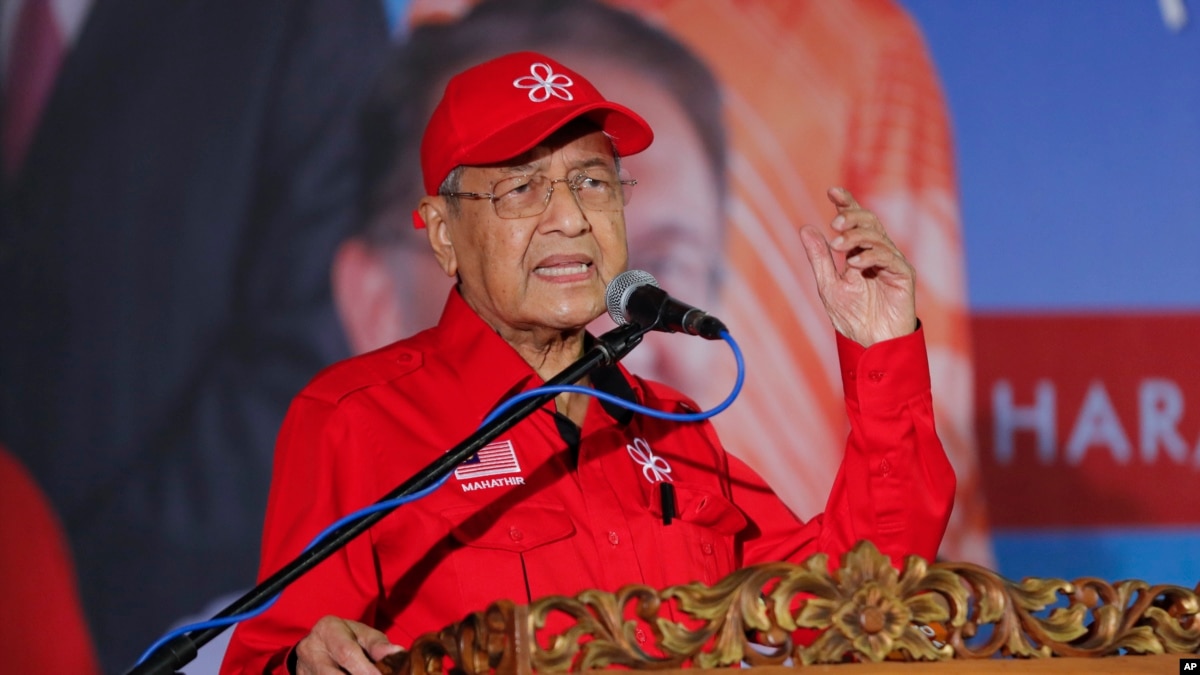
Just months after a stunning election victory, Malaysia's prime minister has had to step in to mollify the country's majority Malay Muslims in recent weeks, underlining a weighty challenge confronting his multi-ethnic, reformist coalition: race.
When riots erupted at a Hindu temple outside the capital, Kuala Lumpur, last week, 93-year-old Mahathir Mohamad spared no effort to scotch speculation that tensions with Malays were to blame.
Just a few days earlier, his government reversed its pledge to ratify a U.N. convention against racial discrimination following a backlash from groups who argued that it would dilute privileges Malays have enjoyed for decades.
The two incidents illustrate the predicament confronting Mahathir as euphoria over the May election fades: curbing racial divisions, carrying out reform and reassuring Malays that affirmative-action policies favoring them in business, education and housing are not about to disappear.
And Mahathir's unlikely alliance - known as Pakatan Harapan, or Pact of Hope - has to do that without upsetting the delicate balance of its constituent parties.
"The problem with Pakatan Harapan as a multiracial coalition is that it is not seen as championing the Malays," said a deputy minister, who asked not to be named due to the sensitivity of the issue.
He said opposition parties are successfully fanning a perception that Malays, about 60 percent of the country's 32 million people, are being abandoned in what some have called 'New Malaysia.'
Malaysia's ethnic Chinese are estimated at 23 percent while mostly Hindu ethnic Indians comprise about 7 percent, government data shows.
Mahathir ousted the long-ruling coalition led by the United Malays National Organization (UMNO), which has pushed positive discrimination for Malays to avoid a repeat of bloody Chinese-Malay riots in 1969. Mahathir was prime minister for two decades at the head of UMNO, before he fell out with his successors.
In the May election, Mahathir's coalition won overwhelming support from ethnic Chinese and Indian minorities, but it secured the votes of only 30 percent of Malay voters, according to estimates by independent polling firm Merdeka Center.
About 40 percent of Malays backed the beleaguered government of former Prime Minister Najib Razak, an UMNO grandee who is now facing multiple graft charges, and the rest voted for Parti Islam Se-Malaysia (PAS), a conservative Islamic party.
A Merdeka poll in August showed that concerns over ethnic issues and religious rights had grown since the election, with about 21 percent citing those issues as a concern compared with 12 percent in April.
Which crowd to please?
For many Malays, the ouster of Najib over the multi-billion-dollar corruption scandal that had swirled for years around the 1Malaysia Development Berhad (1MDB) sovereign wealth fund was fair enough.
But some have been dismayed by moves made by the government of Mahathir — himself once a champion of the Malay 'bumiputera,' or 'sons of the soil' policy — such as the appointment of non-Malays as minister of finance and attorney general.
A lawmaker in the ruling coalition said the initial plan to ratify the U.N. International Convention on the Elimination of All Forms of Racial Discrimination fed a narrative pushed by UMNO and PAS that the government is out of touch with the Malay community, especially the working class.
"The Malays are more focused on socio-economic issues, and if you don't focus on their poverty and hardships, obviously they'll get worked up," said the lawmaker, who asked not to be named because he was not authorized to speak to the media.
Mujahid Yusof Rawa, minister in charge of religious affairs, conceded that the coalition is struggling to convince Malays that its policies will benefit them and protect Islamic values.
"We have had some success in reaching out to them, but if we fail to build on that, it will affect support from Malay voters," he said.
Mahathir, who was prime minister from 1981 to 2003 and is now the oldest elected leader in the world, remains a sharp political operator: many expect he will take steps to shore up Malay support for his government.
It was Mahathir who snuffed out controversy over the U.N. treaty by dropping it, and amid the Hindu temple unrest he promised action to keep the peace, acknowledging that "such incidents ... can lead to bigger problems involving racial harmony."
His administration has also refused to deport an Indian Islamic preacher, Zakir Naik, who is popular among conservative Malay Muslims but is being investigated by Indian authorities for alleged hate speech. Naik began a five-day speaking tour in a northern state last week.
But steps that pander to Malays could create rifts within Mahathir's alliance, which includes the Chinese-led Democratic Action Party and the pro-reform party of former deputy prime minister Anwar Ibrahim. There is an understanding that Mahathir will eventually hand power to Anwar, but the two men have fallen out before.
"As things currently stand, the Malay opposition are saying the government is being dominated by the Democratic Action Party and weak on Malay interests and that it is delivering far less than promised," said Ibrahim Suffian, director of pollster Merdeka. "The danger is that if they try to please one crowd, they push away the other."
Read More In 'New Malaysia,' Race Continues to Cast a Long Shadow : https://ift.tt/2G7a1tM
No comments:
Post a Comment